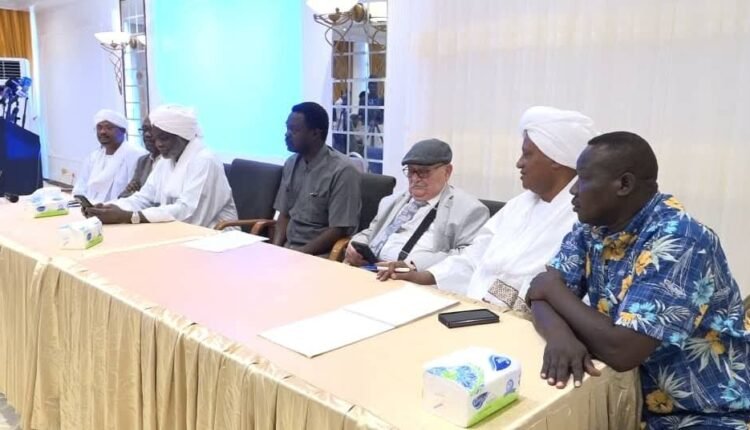The Democratic Bloc Presents Its National Project to Resolve the Sudanese Crisis

The Forces of Freedom and Change: The Democratic Bloc presented its national project to Sudanese political forces at the conclusion of the bloc’s political committee meetings held in Port Sudan, the administrative capital of Red Sea State in eastern Sudan.
In a press conference held after the meeting at Marina Hotel (formerly Coral), the head of the bloc’s political committee, Minni Arko Minnawi, stated:
“The Democratic Bloc is presenting a national project to the Sudanese people that reflects their aspirations for building a state of citizenship that accommodates everyone. It calls for broad national alignment to address the current political realities.”
He added:
“The meeting recommended forming a committee to engage with all political and societal forces to achieve the national project, starting with comprehensive Sudanese-Sudanese dialogue as a fundamental step toward sustainable solutions to the current national crisis.”
Minnawi reaffirmed the bloc’s steadfast commitment to Sudanese-Sudanese dialogue to achieve stability, national consensus, and the establishment of a state based on equal citizenship. He emphasized openness to all parties and the initiation of practical steps for inclusive dialogue without exception. He further noted that the meeting discussed halting the war, finding a political solution through Sudanese dialogue, and addressing governance during the transitional period, including forming the necessary institutions.
Talking to the “Elephant”
Meanwhile, the bloc’s deputy chairman, Jibril Ibrahim, expressed optimism, stating that victory is imminent. He condemned the ongoing support for the rebellion coming from Libya, Chad, Kenya, and Uganda through South Sudan.
Regarding relations with the UAE, Jibril said:
“We have no issue with the Emirati people, as they are dear and friendly to us, and we share longstanding ties with them. However, the Emirati political leadership is killing Sudanese people by supporting the rebellion.”
He added:
“A political solution is important, but we need to address the ‘elephant’ rather than its shadow. Insisting on negotiating with the shadow will waste valuable time, and the Sudanese people have no time to lose with intermediaries or tools. We want to engage directly with decision-makers who have invested their resources and internal tools to perpetuate the war. Dialogue with mediators will not lead to a fundamental resolution.”
Final Communique
The final Communique of the political committee, reviewed by Suanhorion, stated:
“The political committee of the Democratic Bloc concluded its meetings in Port Sudan, which took place from January 14 to 16, with full attendance of its members and chaired by the head of the political committee, Commander Minni Arko Minnawi.”
The Communique praised “the significant victories achieved by the Sudanese Armed Forces, joint forces, security forces, and volunteers in confronting the rebellious Rapid Support Forces (RSF) militia.” It also expressed gratitude for “the steadfastness of the Sudanese people and their support for the armed forces and national institutions,” recognizing their patience and endurance in the face of the RSF’s heinous practices. These victories were described as “an advanced step in preserving the unity of Sudan, both land and people.”
The Communique condemned “in the strongest terms the violations committed by the rebellious RSF militia against the Sudanese people and state institutions,” mourning the martyrs among civilians and military personnel and wishing a speedy recovery to the injured and the return of the missing.
It also rejected U.S. sanctions against General Abdel Fattah al-Burhan, describing them as “false and baseless” and claiming they “attribute actions to the Sudanese Armed Forces and its leader that they did not commit, with the aim of justifying the crimes of the RSF.” The bloc considered the sanctions “unjustified bias, a violation of Sudan’s sovereignty, and implicit encouragement of a criminal militia working to fragment the country.”
The meeting also condemned “chaotic practices and grave violations against citizens in certain villages and camps in Al-Jazira State.” It warned against “taking the law into one’s own hands and returning to personal vendettas,” calling for the prosecution of perpetrators and collaborators with the RSF under the law. The bloc urged the people of Al-Jazira and all Sudanese to uphold the values of the rule of law and promote responsible practices that protect citizens and preserve Sudan’s social fabric.
The bloc welcomed decisions by General Abdel Fattah al-Burhan, particularly the formation of a committee to address unethical practices and investigate crimes and violations in Al-Jazira villages, emphasizing the importance of adherence to the law.
The meeting also discussed preparations for the Democratic Bloc’s third conference as an organizational step to address national issues. In addition, workshops aimed at enhancing the capacities of civil society, youth, and women in various fields, with the participation of local and international experts, were launched.
The bloc stressed the need to broaden consultations on amendments to the constitutional document and ensure that changes align with its provisions.
The meeting emphasized the importance of unifying international initiatives to resolve the Sudanese crisis and insisted that any solution must be Sudanese-led, reflecting the aspirations of the Sudanese people and free from external interference that compromises Sudan’s sovereignty and independence.
Lastly, the statement commended the executive administration’s success in holding Sudanese certificate examinations under challenging circumstances. It wished the students success and called for exceptional exams for students affected by the war.
Shortlink: https://sudanhorizon.com/?p=3786

